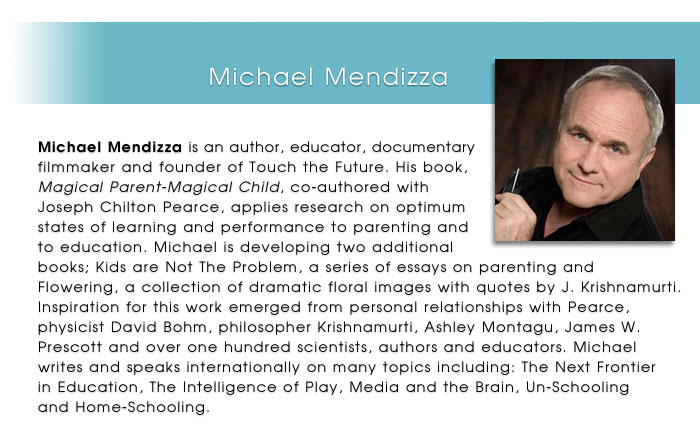
As a documentary film maker I have interviewed hundreds of remarkable human beings and I consider everyone a teacher. Some I call mentors because the trust, respect and friendship we develop becomes a constant source of life-changing insight and inspiration. Joseph Chilton Pearce and I have such a relationship. There are others.
Central to Joe’s life work and passion is something he calls the ‘model imperative.’ Our limitless capacity to learn and grow is shaped and defined by the model-environment.
We can assume that every child, having evolved over billions of years, has undreamed of possibilities woven into every cell of his or her body. What dreams and capacities each unique child develops is dependent on the models given.
This simple insight shifts the focus of human development from the child to the adult model. If we want the next generation to unfold and develop greater understanding, greater empathy, sensitivity, intelligence, imagination and compassion, these qualities must be experienced and modeled day to day in relationship with adults.
The model imperative underscores Gandhi’s insight that ‘we must be the change we want to see in the world.’
As a child grows and develops so too must the adults in that child’s life, in different but parallel ways. Because the world is changing so fast this continued adult growth and change cannot be assumed as it has been throughout all of human history.
Parents and the people who care for children MUST be mindful of the behavior they are modeling for children moment by moment. This demands greater presence, attention, careful observation and sensitivity in a world that is more demanding, uncertain and chaotic than ever before.
The model that shapes the lives of children is the actual ‘state’ of the adult as they respond to life’s challenges: calm, fear, anxiety, trust, open, flexible, ridged, anger, affection, humor. Learning and behavior are ‘state specific.’ The state one is in as we relate to any experience shapes and defines what we learn and remember from that experience. States of relationship are primary. The feelings and concepts we formulate emerge from our primary states of relationship.
Understanding this simple fact represents a powerful key to our continued growth and development, the development of our children and the species.
To the degree that we are mindful, that is, not simply reflexive, we have the full power of personal and global transformation in our hands. The way I respond to this moment can be just like the last, reflexive, habitual or, this instant, by being slightly more awake, aware, attentive, in a word mindful, I can break the bonds of habit and tradition and forge a new path, a new way of seeing and relating to the world.
This attention and transformative potential is a state. Athletes call it The Zone, researchers call it Flow. Children call it Play.
This state is the essence of real intelligence and creativity. Our goal is to help adults rediscover this optimum state of learning and performance by experiencing, developing and sharing this state with children.
Cultivating and exploring this state is both a vision and a daily spiritual practice. All of the resources you find at Touch the Future are tools to help you along the way.![]()
Explore The Next frontier in Education in a series of essays.
To view/download – click the link.
Parenting Taboo
Creativity and Innovation – Interview
Sensory Deprivation and the Developing Brain
Pleasure Bonds
Everyday Abuse
Transpersonal Parenting
The Next Frontier in Education
Kids are NOT the Problem
Just say NO to Baby Einstein
Raising Shameless, Free, Responsible Young People
Sacred Playgrounds for Parents and the People Who Care for Children
The Genius of Childhood Rediscovered
Living Fully Moment by Moment
Enlightenment Now, because our lives depend on it.
Reality Isn’t What It Used to Be
Political Media Literacy with Jerry Mander, Part One
Political Media Literacy, Image vs. Issues, Part Two
Political Media Literacy, Deregulation & Misinformation, Part Three
Propaganda, Dirty Tricks and the Erosion of Democracy
Freedom, Safety & Ecstatic Learning
Basic Trust, Learning & The Intelligence of Play
No Agenda, David Bohm’s Theory of Dialogue
Are We There Yet? Reflections on Dialogue
Discovering Imagination-Part I
Discovering Imagination-Part II
Discovering Imagination-Part III
